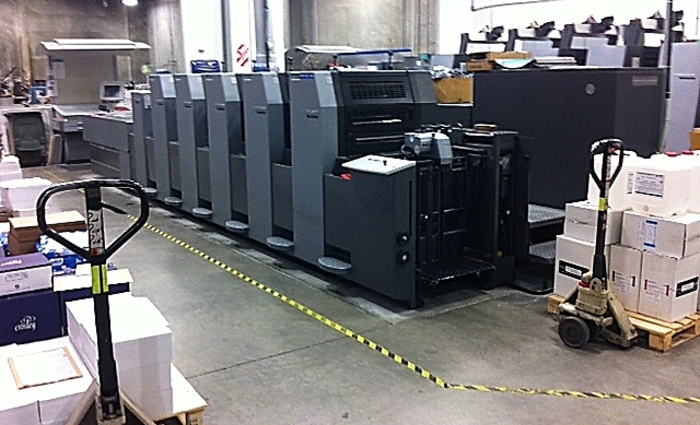As the government works to contain covid-19 and our first week of lockdown comes to an end, industry members have kept PrintNZ busy with queries ranging from wage subsidies to what constitutes an essential service.
PrintNZ has made submissions and is constantly working for the industry. Ruth Cobb, PrintNZ general manager, has reminded everyone that the definitions of an essential services, “continue to be tweaked. On Friday afternoon (March 27) we were caught by surprise when the government announced that only the daily newspapers were considered essential services and all other printed newspaper and magazine production was to cease immediately.
“This decision came without consultation and in conjunction with the Community Newspapers Association we have spent the weekend talking to officials and MPs, writing submissions and doing interviews to hopefully have this overturned, a few of the key points being:
- Over 1.2 million community newspapers are delivered each week and they play a very valuable role in disseminating both local and national information into our communities.
- This decision would leave some communities without any printed papers as some of the regions such as Whakatane, Nelson and Marlborough are published 3-4 times weekly, not daily.
- There are many regions that geographically fall in between the coverage of the dailies and they are serviced by local papers.
- The dailies are all subscription based so this would exclude those not on a subscription or require people to leave their house each day to go to the dairy to buy a paper
- Vulnerable people in the community could be left without news – the elderly, lower socio-economic households and those who rely on foreign language papers.
- At a time when communication is of paramount importance, it seems counter-productive to reduce the channels of communication, particularly print channels which we know are well read.
“We will continue to push this issue to get the decision reviewed and provide assurances to the Government that these services can continue without putting the community at risk.
“Likewise, we will continue to monitor changes to the Essential Services list to ensure all our members are operating within approved parameters.
She adds that wage subsidies are available for casual workers. She says, “You can make a claim for the wage subsidy for your casual workers if they were working for you at the time you apply and would have been expected to work during the time the wage subsidy will cover. As they may have variable hours, to assess their subsidy rate you should average their hours over the last year (or less if they have not worked 12 months). If the average is 20 or more hours, apply for the full time subsidy ($585.80). If it is less than 20 hours then apply for the part time subsidy ($350).
If the wage subsidy you receive is more than an employee normally earns (this applies to all employees), you only pay them their normal wage. For example, if you have a person that works 20 hours per week at $20 per hour, their normal pay is $400. You will receive a wage subsidy of $585.80 but you are only required to pass on $400 to them. The balance of the subsidy can go towards topping up other employees’ wages. However, you must spend the entire wage subsidy you receive on wages and you must be able to account for this.”
She add that businesses can claim a rent abatement if their business is closed. She says, “You may be aware that some leases contain what is known as a ‘no access in an emergency’ clause. This clause provides that if: there is an emergency; and the tenant is unable to gain access to the premises to fully conduct the Tenant’s business from the premises because of reasons of safety of the public or property or related to the emergency, the tenant may claim an abatement of a ‘fair proportion’ of the rent and outgoings for as long as the tenant cannot access the premises due to the emergency.
“There has been a fair amount of discussion about whether tenants can now make a claim under this clause. Our view is yes, they can. Since the government’s covid-19 response escalated to Level 4 from March 25, 2020, with all non-essential business directed to close their places of work, most tenants should be able to claim a rent and outgoings abatement if: they are on a form of lease that contains this clause (which is found in any unamended ADLS lease form since 2012 at clause 27.5); and they do not operate an essential service from the premises.
“The ability to abate rent and outgoings (for non-essential business) could provide some significant relief to those businesses, many of whom are facing rental payments due.”
The government has issued its recommendations for the use of Personal Protective Equipment for people in essential jobs that may require physical or close contact as follows”
If you can ensure more than 1 metre distance from people with potential covid-19 symptoms and any surfaces or items they may touch – facemasks and gloves are not recommended.
If the nature of your job means you may touch surfaces or items also touched by people with potential covid-19 symptoms, you may consider wearing gloves, however facemasks are still not recommended.
If you may be unable to maintain more than one metre contact distance from people with potential covid-19 symptoms, facemasks and gloves are recommended when this contact is likely to occur.
In all situations, regular hand washing should continue.
These recommendations are a guide only and workplace settings should consider their ability to maintain the one metre rule. In general, surgical and medical masks prevent the dispersal of droplets by an infected patient and the inhalation of droplets if within one metre of a coughing individual.


